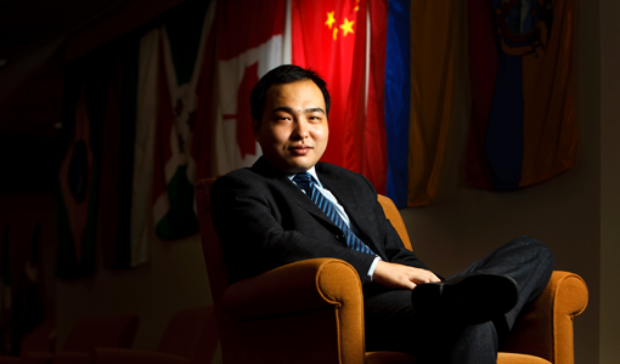Studying abroad: Chinese students in the United States More than 98,200 Chinese students studied in the United States during the 2008-09 academic year. Only India sent more students to American colleges and universities. The most popular field of study for all international students within the United States was business. Reflecting national trends, in fall 2008, the greatest number of international students studying at St. Thomas were from India, followed by China.
Why do Chinese students flock to the United States? Reasons include the value of a degree from a U.S. college or university and the desire to learn more about our country. But these students are not the only ones to benefit. The New York Times reports that students from China brought $18 billion into the U.S. economy during the 2008-09 academic year. Their presence is not only an economic boon to the United States; it also benefits American students, who can learn from their Chinese counterparts.
Jing Zhang: From China to UST Jing (Ariel) Zhang first came to the United States as a master’s degree student at Missouri State University, where she was studying enology (wine making). In Missouri, she made friends with business students who impressed her. Deciding she should pursue an M.B.A., she began preparing for the GMAT. During this time, she met a woman who had earned a bachelor’s degree from St. Thomas. “Her excitement when talking about UST made me curious and eager to learn more,” says Zhang. Zhang applied for the Full-time UST MBA program and is now a student at St. Thomas.
“An M.B.A. is still a young degree in the world, especially in China,” says Zhang. “But China is on a rapid growth path – everything is developing fast, and young people are very eager to learn. An M.B.A. earned in the United States is seen as especially valuable in China.”
Zhang is working with some friends to develop a network company in China. “This is what I love about my country,” she says. “Young people are so passionate and work so hard to build a business. I think it is because we all believe in a tomorrow which will be better than today.”
Eric Wu: From China to UST Eric Wu knew he wanted an M.B.A. to prepare for a career in the medical device industry. He felt that the quality of U.S. MBA programs was superior to MBA programs in China, and that he would get better value studying in the United States. Having met with Professor Heino Beckmann at an education fair in Shanghai, Wu was intrigued by St. Thomas, especially its Twin Cities location, giving him access to the industry which most interested him. A generous financial aid package finalized his decision, and he enrolled at St. Thomas.
After graduation, Wu plans to return to China. “The economic development in China attracts interest everywhere,” he says. “More and more Fortune 500 companies are establishing their operations in China. They need employees who can communicate with headquarters and know the local business. Therefore, people with an overseas M.B.A. degree are a good fit for them.”
A year into the Full-time UST MBA program, Wu feels that he has grown more independent than he was as a typical only child in China. He notes the most interesting thing for him has been getting to know “real American people, not those stereotypes in movies.”
Wu is a market analyst intern at St. Jude Medical, where he will present on the cardiovascular market in China at the end of his internship. “I am still learning how to work in corporate America,” he says.
Fang Xie: From China to UST Fang (Joyce) Xie ’10 M.B.A., was working for Tennant Company in China when she decided she wanted to pursue her master’s degree in the United States. “I wanted to go abroad, because a Chinese master’s degree would be more theoretical,” she says. Because Tennant’s headquarters are in Minneapolis, she was strongly encouraged to choose either St. Thomas or the University of Minnesota. Xie chose St. Thomas and was pleased with her choice.
“People here are very kind,” she says. “The professors and staff are helpful to international students. If you can’t understand a professor, he will slow down. I also liked the small classes.”
Although she enjoyed pursuing her M.B.A., she also found it very different from her education in China. “There are not a lot of team projects in China,” she says. She found that her biggest challenge came during a team project. As the sole international student on that team, she felt she was having difficultly making herself understood. “Americans think differently. If I contributed, I felt devalued, because I was not doing things their way. But if I didn’t, there were no excuses for my lack of participation.” She found other team experiences more enjoyable, especially in situations where the teams broke the work into different parts or voted on their decisions.
Socializing also was a challenge. “Westerners like to go to bars,” she says. “In eastern countries, we aren’t accustomed to that.” During her time here, she learned about networking and business associations. She began to take the initiative more often, rather than waiting for opportunities. “I’ve changed my ideas,” says Xie.
Studying abroad: U.S. students in China The most recent data from the Institute of International Education shows that China was the fifth most popular study-abroad destination for U.S. students during the 2007-08 school year. Within the last three years, the number of students from St. Thomas going to China has increased dramatically. St. Thomas’ International Education Department, which tracks only undergraduate study abroad, reports that in 2007-08, four students studied in China under co-sponsored programs, and six studied under such programs in 2008-09. There were no faculty-led, short-term trips to China during those years. During the most recent academic year, 13 students have gone to China under co-sponsored programs, and another 13 went on a short-term faculty-led trip.
Tim Dohmen, a study-abroad adviser, reports that China is becoming an increasingly popular study-abroad destination because, as one of the largest, fastest-growing economies, it is more visible to the Western world. He also believes that the Beijing Olympics made a huge difference in the perception of China in the Western world’s eyes. “It seems less ‘foreign’ now, and the opportunity to go is more appealing. Prior to the Olympics, people had heard that China was ‘up and coming,’ but the visibility that China gained with the Olympics played a huge role in attracting attention to the country.”
U.S. students who go to China face many challenges, including a different academic approach that is more formal and lecture-based with fewer opportunities for students to be evaluated prior to exams. But with the challenges come enormous opportunities. Studying in China, rather than a Western location such as London or Paris, puts students in situations where they will have to deal with more stark cultural differences. “It’s more difficult to pick up on differences in the West,” says Dohmen. “Students who go to China will develop a more informed, global perspective.”
Tiffany Cheng: From UST to China Senior Tiffany Cheng, an economics major, studied in Shanghai during the 2010 spring semester. She had originally considered studying in Europe, but the euro was too strong. She knows how to speak Chinese, so she decided that going to China would enable her to learn more and improve her language skills.
Cheng describes her stay in China as “an adventure every day. I always saw something new. China is still developing. Parts are westernized and parts are traditional.” One of the things that impressed her was the number of different cultures she encountered within Shanghai.
The academic environment in China was very different from what Cheng had experienced. “Here, you think for yourself. There, you go by what the teacher and the book say. Here, professors hold your hand. There, we had a paper due, and we had to ask about what was expected. The professor said, ‘I’m not used to students asking that.’ There was shock on both sides. It was an adjustment.”
For Cheng, one of the greatest benefits from going to China was learning about herself. “I learned I can be on my own in a different country. I can take care of myself.”
Demar Lewis IV: From UST to China Senior Demar Lewis IV is pursuing a major in international business and a minor in American culture and difference. In fall 2009, he spent a semester in Shanghai.
Lewis says that he wasn’t considering going to China, but Dr. Susan Marsnik talked with him and encouraged him to consider studying there. “She said that it seemed like I was willing to take risks, and that the experience would be valuable to me.” Following his conversation with Marsnik, Lewis received further encouragement from Dr. Lawrence Potter, formerly the executive director of the Office for Institutional Diversity at St. Thomas, and Dr. Mary Maloney.
When he got to China, Lewis proved that Marsnik’s faith in him was not misplaced. He took classes, doing the best he ever had academically; pursued research on American companies operating in China as part of the McNair Scholars program; volunteered at the Shanghai Renewal Center, a Christian-based organization that addresses the needs of homeless migrants from rural China; and immersed himself in the culture. “My time there was very valuable, so I maximized every second,” he says. “I spent long nights studying characters and then doing research.”
Lewis feels that his time in China had enormous benefits. “It allowed me to develop multicultural communication skills, cultural competency and linguistic skills.” He says that, while he has always been confident, studying in China increased his confidence in his ability to overcome obstacles. He also is more sensitive to the needs of people from abroad who are in the United States. “Sometimes we are impatient,” he says. “I needed help from my roommate and teachers. It’s important that we lend a hand to others. Ultimately, we’ll have to work together.”
Lewis hopes to return to China after graduation to study and ultimately work there. His goal is to become a director of global operations for a multinational corporation or director of global operations for a market research firm.
His advice to others who are considering studying in China? “Go. Challenge yourself. You don’t know what you’re capable of. Be prepared for a rigorous experience, but also for the most fun you’ll have in your life.”
Read more from B. Magazine








